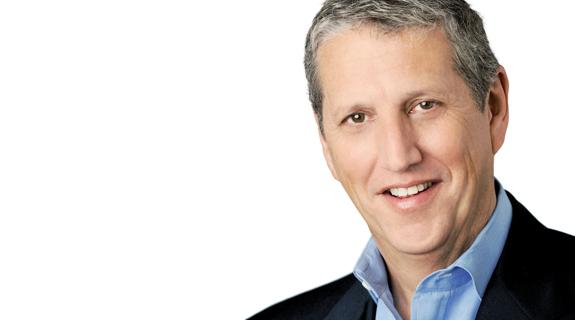Earlier this year, TV programming vet Doug Herzog was promoted to president of the Viacom Music and Entertainment Group. That move took him back to his roots as a young cable programming exec, adding oversight of MTV and MTV2 as well as LOGO and VH1 to his portfolio, which also includes Comedy Central and Spike.
The move was a sort of homecoming for Herzog, having come up through the ranks at MTV starting in 1984, and then moving on to Comedy Central where he launched the then-controversial South Park (raise your hand if you still know all the words to “Kyle’s Mom is a B—-”), and The Daily Show starring Craig Kilborn.
A seasoned executive, he left Viacom in 1998 to run Fox Broadcasting and USA Network. He rejoined Viacom in 2004 and since then has been running Comedy Central, Spike and TV Land.
Herzog’s shepherded a show or two from idea to hit (ever heard of Key & Peele? how about Inside Amy Schumer? Monk? Malcolm in the Middle?).
He’s currently enjoying the success of Spike’s Lip Sync Battle, while prepping for South African comic Trevor Noah to take over The Daily Show later this summer. (Social media firestorm aside, “He’s the only guy out there who will be bringing a true millennial and global point of view to late night,” Herzog says.)
Herzog’s got enough experience to know that the TV landscape is shifting under his feet, but he seems steady. Brief took a few moments to chat with Herzog in advance of his keynote interview at The Conference 2015 in Los Angeles on June 9.
Brief: TV’s in the middle of its great disruption. How do you see Viacom’s role in this new environment?
Herzog: I’m not sure there’s ever been a time where content is more powerful. We have some of the world’s most valuable and powerful content brands. The combination of great individual content partnered with the right brand is a big advantage in a world that is moving in a lot of different directions. These brands truly mean something to our viewers and fans. There’s an awful lot to be figured out, both inside and out of Viacom, but we feel good about our chances to evolve and continue our success because of our great brands.
Brief: How do you see networks working in concert with digital and on-demand distribution so that both are successful?
Herzog: The role of the linear network is changing. Over the course of time, we are going to have to find different ways to program it, given the way that consumption is changing. But it’s still a great, if not the best, place to platform something, just because it’s the big screen. Hopefully, it’s also the most desirable screen and it’s through those traditional linear channels that we’re still reaching a bigger chunk of the audience.
People are watching content in a lot of different ways, on a lot of different platforms and a lot of different devices. We’re seeing huge changes in the way people consume, so the truth is people are not watching less TV, they are watching more TV and they are certainly watching more of the good stuff. It’s a great time to be a consumer because you get to choose what you want to watch and when, and there’s a bigger focus on quality of the stuff that we as creators create. I think the truth about what happens with linear going forward is the death of the stuff in the middle. I’m not sure a lot of the singles and doubles survive in the new universe.
I don’t know that every player today should take their role in the 2015 media universe for granted.
Brief: How much do you consider whether a show will play on digital and social platforms before you pick it up?
Herzog: I’d like to say there was a scientific approach but it starts at the moment of inspiration. We had an opportunity to do Lip Sync Battles on Spike. We understood that a lot of the applications around the show would be useful in a multi-platform universe that’s heavily reliant on social media.
All of that is great if it works. But it only works because the show is good and people want to see it. The fact that it’s got applications to social media and travels well across platforms is something that gets checked off in the advantage box. The show still has to be something the audience wants to see.
In this world of algorithms and data, it’s still the execution of the idea that matters. There are so many different things have to line up in order for a show to hit. You will never change my mind about that. Hits come from people, they don’t come from data.
What gets me to sleep peacefully at night is that content is the center of the universe. It’s the thing from which all these other things exist. That’s what we do and if we continue to do it in the most compelling way possible, we’ll be successful. I don’t think there’s any question that this entire industry is going through a pretty disruptive time right now but TV, movies and radio are all still here. It’s our job to get that content to them in most efficient way and then it’s incumbent upon us to figure out how to monetize it.
Hear more from Herzog at PromaxBDA The Conference 2015, June 9-11, 2015 at the J.W. Marriott L.A. Live.
Tags:













































__twocolumncontent.jpg)











